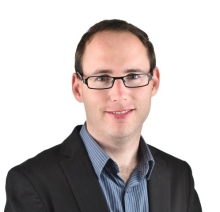CBE Seminar: Protein-based Biopolymers as a Platform for Enabling Long-range Electron and Proton Transport

Non-UCI people, please use this registration link: https://forms.gle/FukoaDjniUNbX8dq7
Abstract: Our study is concerning the use of proteins for the making of large-scale free-standing biopolymers followed by investigating their ability to support charge transport. One of our inspirations for the choice of proteins as the medium for charge transport is the natural role of proteins in mediating charges. The field of protein-based conductive (bio-)polymers has only recently emerged, whereas to date, most of the protein-based conductive materials are a result of synthetic biology (protein expression). Our approach is based on identifying waste proteins that are available in bulk quantities from raw materials and using them preferably in a green polymerization to create conductive biopolymers, a methodology that can be considered more sustainable. The protein that we have used the most in our studies is the bovine serum albumin (BSA) protein, which is a waste product of the extensive bovine industry. We show that we can form large-scale highly-elastic, free-standing and insoluble polymers on the macroscale. Due to the water uptake of our protein-based polymers and the presence of oxo-amino-acids, our new protein-based polymers show excellent ionic conductivity in the order of 5 mS/cm, which we ascribed to protonic transport. Using various postpolymerization modifications (PPM) as well as physical modifications is allowing us to explore the important factors and mechanism of the protonic transport, where we show the important amino acids participating in the process and the important role of the protein:water interface in dictating the transport efficiency. While switching to electronic transport, we have two methodologies of enabling such transport across the BSA structures. The first one is based on the ability of BSA to strongly bind a variety of small molecules. We use such ability to bind electron-mediating groups into the protein matrix in a process we refer to as molecular doping. This process is allowing us to discuss the role of biological (or nonbiological) electron mediators in long-range electron transfer across proteins. The second methodology is PPM, where we can chemically decorate with common conjugated mono-/oligo-/poly-mers used in the conductive polymers field. In this way, we are creating a chimeric system with mixed conductivity: protonic transport through the protein matrix and electronic transport through the conjugated system. From an application point of view, our new protein-based biopolymers have several attractive properties; they are environmentally friendly, they possess inherent biodegradability and biocompatibility, they have good mechanical properties, and their formation obeys most principles of green chemistry. Moreover, due to the low price tag of our chosen proteins and the simple formation process, the cost of the biopolymers can reach as low as 1 U.S. dollar for 100cm2 of the final polymer. Currently, our main targeted application for our new family of polymers is for biological interfaces, and we show their use in biosensing applications, while other lines of applications include the use of our biopolymers for biomedical and energy applications.
Bio: My academic journey started in Tel Aviv University, where I was studying for my bachelor's degree in biotechnology. I continued in Tel Aviv for my doctoral studies in an intriguing collaboration between biology (with Professor Ehud Gazit) and electrical engineering (with Professor Gil Rosenman), working on the optoelectronic properties of peptide structures. After acquiring my doctorate, I’ve joined the groups of David Cahen and Mudi Sheves as a postdoctoral scholar at the Weizmann Institute, where i worked on electron transport across proteins. For my second postdoctoral position, I joined the group of Molly Stevens at Imperial College London to work on charge conduction across biological scaffolds. Even though my education was in biology, i have been warmly welcomed by the academic family of the Faculty of Chemistry in the Technion. Since 2016, I’ve been a member of the faculty, with my research focusing mostly on electron and proton transfer processes together with the making and modification of biological materials, primarily protein-based and membranes.
Host: Associate Professor Alon Gorodetsky
Share
Upcoming Events
-
EECS 294 Seminar: Programming Light Diffraction for Information Processing and Computational Imaging
-
MAE 298 SEMINAR: Stretchable Electronics for Soft Biological and Robotic Systems
-
CBE Distinguished Lecture/CBE 298 Seminar: Computational Design of Peptides as Detectors, Sensors and Drugs
-
MSE 298 Seminar: Molecular Modeling in the Age of AI - From Energy Materials to Device Simulations
-
CBE 298 Seminar: Metal Electrodeposition for Modern Mineral Refining
